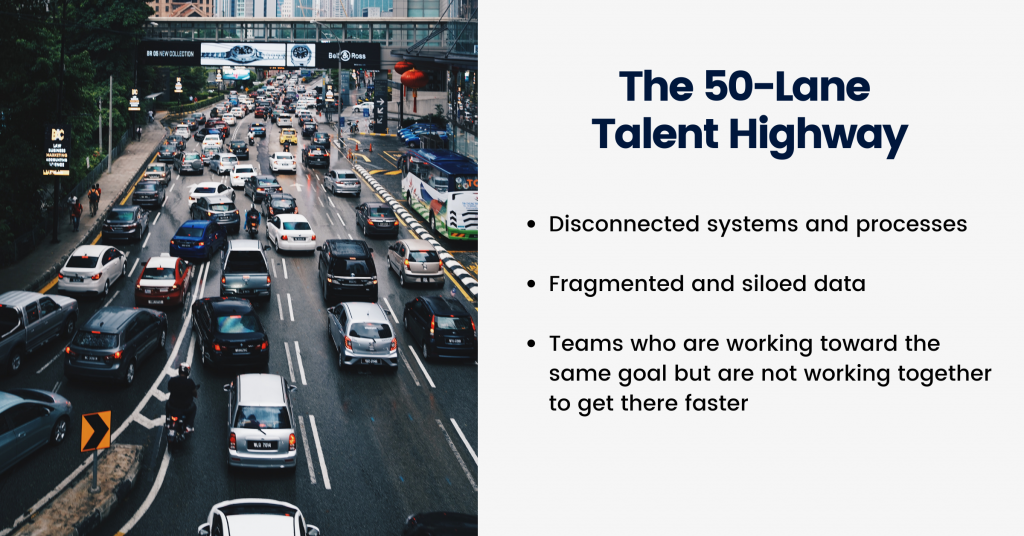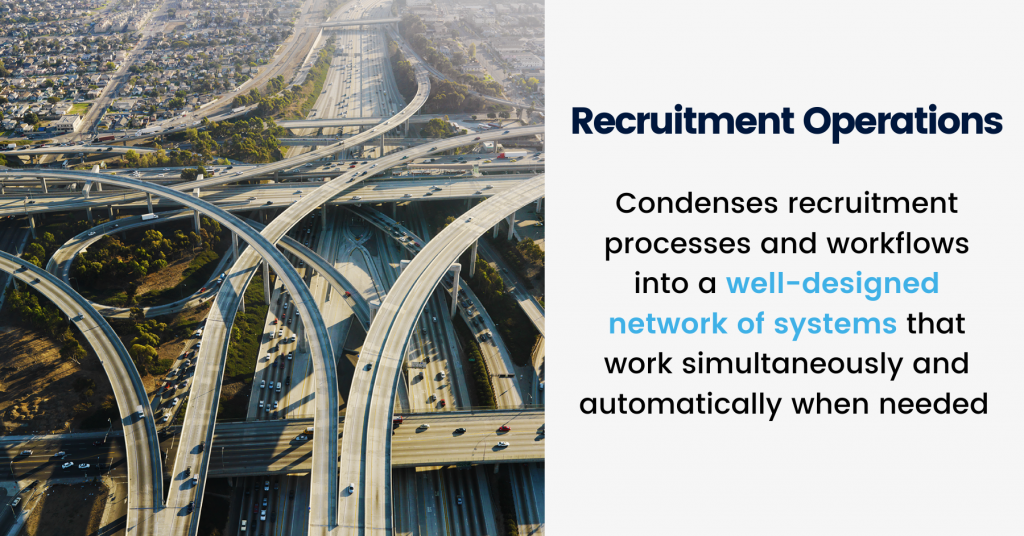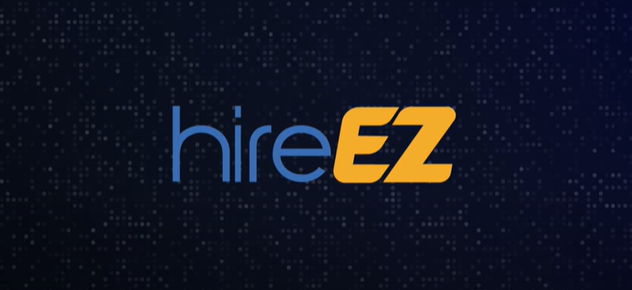The 4C's of Recruitment Operations: Designing A Problem-Solving Process
JANUARY 25, 2022 3 min read
If you haven’t already noticed, Talent Acquisition is vaguely defined and commonly misunderstood. Talent Operations, or Recruitment Operations, is even more misunderstood.
We once talked about this with Talent Acquisition Partner, Scott Faurot, who was eager to call out that acquiring and securing talent was merely a “crude definition” of the function. “Talent Acquisition really are the drivers of raising the bar for talent [in an organization],” he added.
Much like how you would raise the bar for anything, a system is created and followed to hold simultaneous responsibilities in place. You can’t buy a bigger house if you don’t have a long-term system to keep track of spending, savings, and investments so you reach your goal.
For every company, talent is an asset that must be planned for in the same way.
The 50-lane talent highway
Besides attracting and converting talent, responsibilities of a Talent Acquisition team include planning and strategizing across departments, analyzing data, creating job descriptions, coordinating interviews, collecting onboarding documents and supporting employee training and retention programs.
The pandemic was a reminder for companies to invest in streamlined talent management systems that could adapt and keep all these responsibilities running even when the job market was unpredictable. Deloitte found that 67% of global corporations wanted to significantly increase focus in recruitment operations to grow post-pandemic strategies.
Imagine a 50-lane highway leading a hiring team to their goal for the quarter. If one person, tool, or workflow is out of place, it could suck big dollars and a lot of time to reach a destination. By investing in recruitment operations,companies are committing to provide talent teams with the resources to fill process gaps with the help of better tools and data.

What is Recruitment Operations?
Recruitment operations is a growing focus among talent teams today who have to work with more technology systems, fiercer employer competition and a saturated attention economy. A simple definition is — recruitment operations condenses your 50-lane talent highway into a network of systems that can work simultaneously and automatically when needed.

Every talent team’s operational framework is different.Some companies have dedicated professionals who take on the responsibility of maintaining these systems. Other companies may have a team of Talent Acquisition professionals who continue to recruit while carrying out different operational responsibilities.
Whether you’re a part of an operations team or if you’re a one-person operations team, the goal of this function is not about picking the hottest tool in the market. It’s about designing a process that helps find and fix simultaneous problems to help Talent Acquisition teams become more effective.
To condense your 50-lane highway, you’ll need to condense your approach to solving problems. You can start by grouping your responsibilities into buckets that we like to call the 4Cs of operations.
Calibrate systems to desired experiences
To calibrate systems to the desired experience of your leaders, recruiters and candidates, recruitment operations must first identify existing problems and map them to possible solutions. The key to calibration is understanding a situation in entirety.
✅ Do you know the exact impact of every tool and workflow?
✅ Do you know if your recruiters are spending their time the way they want to?
✅ Do you know what each and every role on your team really needs?
There is a difference when you calibrate to a desired goal vs calibrating to a desired experience.
Recruiter experience: Achieving x amount of hires while spending y amount of resources
You may find that your team has the potential to double your goal if the desired experience is met. This is where you begin to audit what you currently have and begin to introduce new tools or automation workflows that can help drive efficiency in time-consuming or low-conversion areas.
Convey the ‘Why’
Try asking anyone who manages system operations and they’ll tell you that it’s never easy to have everyone on a team be 100% on board with a new tool, regardless of how effective it may seem to be. Recruitment operations is no exception. In fact, 8 out of 10 companies struggle with adopting HR technology after purchase.
A team or individual in charge of recruitment operations is responsible for showing teams the value a new tool or system has on their day-to-day work. hireEZ partner and TRAP Recruiter, Keirsten Greggs, leads talent operations initiatives with the principle that tool training should not be how-to sessions. “I like to think of our role as more than just training on how to use a system because you can get that from a manual. Ops training is about how recruiters will engage with a system to be more effective,” she says.
If your team doesn’t see the value of something new, your 50-lane highway won’t be getting any leaner. On the contrary, you’ll run into more accidents by those who don’t want to follow road rules. So as you build out your technology adoption plan, keep the ‘why’ front and center by:
🧱 Breaking it down to the basics: Show your team the numbers that drove this decision at the executive-level. Treat them like a decision-maker and help them understand the data the way you would help your CEO understand it.
👟 Speaking to the user’s motivation: Emphasize how this new tool or workflow would affect their day-to-day responsibilities. How many hours will they save? How will it help them drive their KPIs? Give them examples — A popular one among hireEZ customers is demonstrating the difference working with a 50-field spreadsheet versus our real-time ATS integrations.
💪 Preparing for challenges they might face: Ask yourself if anyone on your team would have an issue switching to something new, and determine the bottlenecks they might face. From there, work with your technology vendors to provide a support experience your team can depend on if they run into any problems.
The formula to getting team buy-in is balancing hard data with relatable human stories. Your team doesn’t want to be treated like a machine that only generates output. To convey the why of an operational investment requires you to prove to them you get what they go through and you understand their day-to-day work — that’s exactly why you know they’re going to do that much better with a new system in place.
Collect feedback and data
Data and feedback is the bread and butter of recruitment operations. You can’t have a team operate smoothly if you don’t know what they like and dislike, and if you don’t have the numbers needed to keep your team accountable and informed.
Our good friend and hireEZ power user, Trent Cotton, wrote a great article about the importance of the feedback loop in the recruiting process. He brings up Netflix’s recommendation system as a great example of how feedback is used to refine the user experience.
If Netflix didn’t pay attention to the little details — like the titles we click into, the shows we ditch after watching only 10 minutes of it, or the genres we tend to gravitate to — we probably would not be able to search through a behemoth of consumable content to find those few that fit our taste best.
The same goes for the recruiting process. Every detail holds a perspective that could inform a solution to an existing or impending problem. Your data should always tell a story. You can do this by:
💻 Tracking little details consistently: Keep your meeting notes, email threads, poll results and survey responses organized. This feedback gives your data more context to help you find the start and end point to your problem.
🧠 Measuring what you need to know: More data isn’t always a good thing. Make sure you’re collecting data that could potentially help you answer a question. If you notice you’re tracking numbers you know you won’t use, scrap them.
🤩 Make it visual wherever possible: Not everyone may love data the way you do. A great way to keep everyone excited about numbers is to make it visually appealing and easy to digest. Interactive reports, dashboards and data visualization platforms can help you bring dry data to life.
Our conversation with June Brokos, Director of Talent Management at FI Consulting perfectly encompasses the idea of prioritizing data that helps her understand her team’s process better.
“What’s been most important to me when evaluating a tool isn’t the number of hires we’ve made but how long it takes for us to find quality people. If we put our effort into hireEZ, I know we can find these people whereas with other tools we’re not. In all these minutes I spend in hireEZ, I look at how many incredible people were identified,” she says.
Create effectiveness, not vanity
The biggest trap about data is the sheer obsession that many have over it. There’s a reason ‘data scientist’ was called the sexiest job of the 21st century.
So it’s important that you remember the goal of your data — to create effectiveness. Data should not serve a selfish purpose. Tracking sheets of vanity metrics brings little impact, but a consolidated set of data that serves a purpose will light the path to business goals.
It becomes easier to juggle simultaneous moving parts when you look at data as a means to an end, and not an end in its entirety. A good number and a bad number doesn’t necessarily mean good and bad. If you compare it with data from a different report, you might find a brand-new perspective to your problem. As mentioned in the section above, data always tells a story.
A great example can be found in how Amtec Inc. uses hireEZ’s Reports page. Ryan Mann, Direct Hire Manager at Amtec Inc. analyzes data by mapping out different situations his team runs into that may be affecting those numbers. “The reports give me a good idea beyond just how my team is using hireEZ, but it lets me understand the psyche of my recruiters. I may see that one recruiter only messages 35% of candidates while one recruiter messages all of them, so now I know that one person would need to widen the gates a little bit while the other might need to take a better look at who he’s reaching out to,” Ryan says.
Here we can see that a 100% doesn’t mean 100% effectiveness and a 35% doesn’t mean ineffectiveness. It opens up possibilities. It needs a next step.
In this case, Ryan maps his next steps out. He can analyze this engagement data alongside a report breaking down the candidates sourced on hireEZ to understand what each recruiter on his team considers a ‘qualified candidate.’ From there, he goes back to Step 1: Calibrate, and evaluates if recruiters are having trouble finding the right candidate on hireEZ or if they’re having trouble with the tool from a technical standpoint.
Don’t fit recruitment operations into a template
The biggest takeaway from this guide should be that your recruitment operations framework can look completely different from someone else’s. With different challenges to overcome, different goals to meet, and different people to collaborate with, the way you approach these 4Cs will continue to evolve.
As you calibrate, convey, collect, and create, you’re bound to experiment with different tools, training methods and reports every quarter or year. Regardless of the different changes you’ll have to make, your goal is met when you can proudly say your 50-lane talent highway isn’t one anymore.
newsletter
Subscribe for our daily news
By filling out this form you agree to hireEZ's Privacy Policy and consent to receive communications from hireEZ.
Outbound Recruiting
newsletter
Subscribe for our daily news
By filling out this form you agree to hireEZ's Privacy Policy and consent to receive communications from hireEZ.
Stay Up-to-Date on Future Talent Acquisition Events
By filling out this form you agree to hireEZ's Privacy Policy and consent to receive communications from hireEZ.
related BLOGS
videos

hireEZ - Outbound Recruiting Made Easy!

A Hiring Superhero Rebrand Made EZ